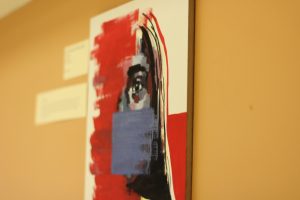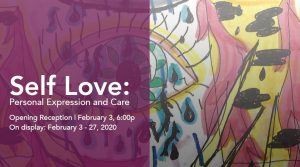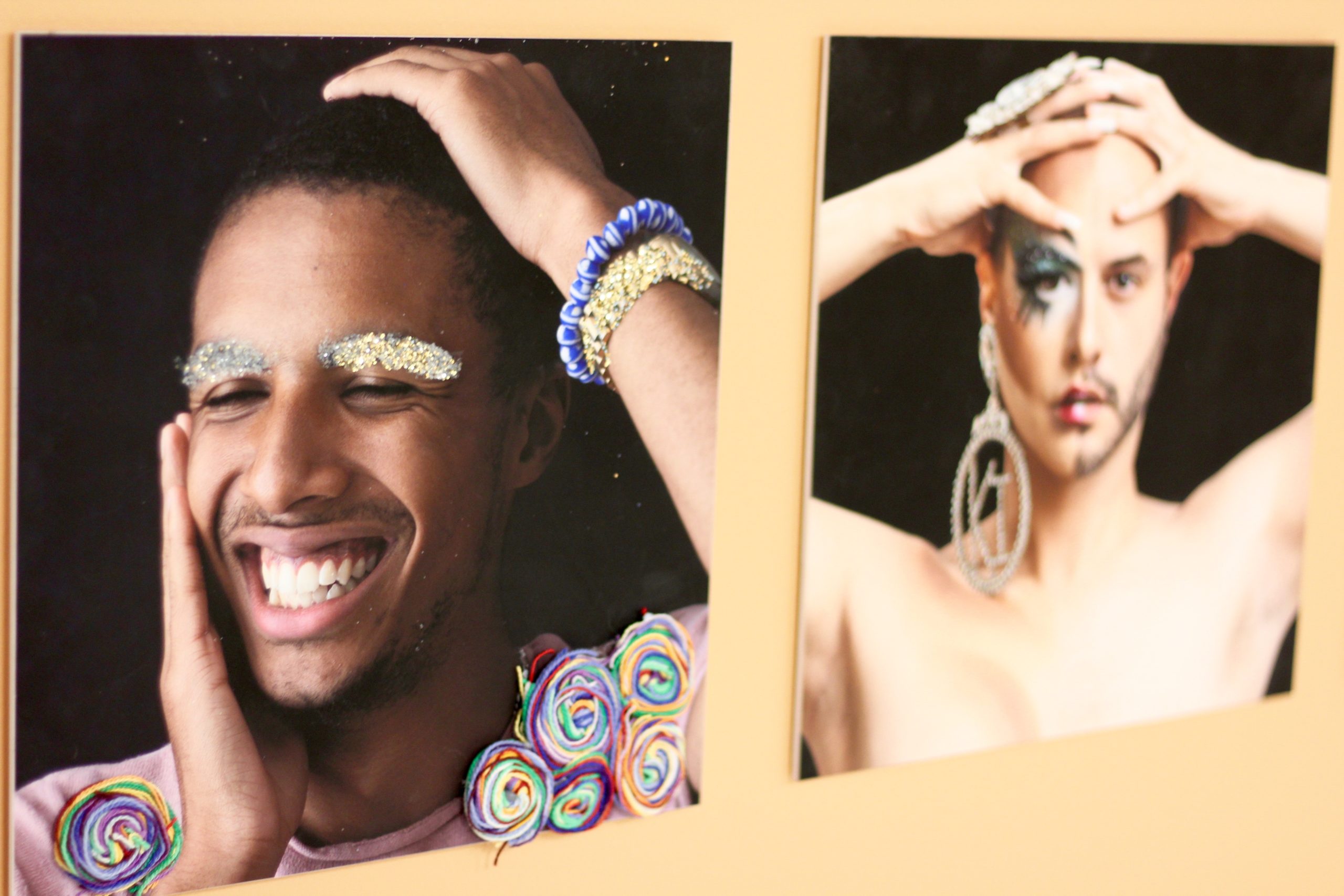In a 1988 speech, the influential Black lesbian poet Audre Lorde said, “Caring for myself is not self-indulgence, it is self-preservation, and that is an act of political warfare.” In the age of treat yourself face masks and Netflix binges, in which the social and political contexts of self-love are too often lost in the shuffle, it’s crucial to remember that self-love originates in queer history.
In its latest exhibition “Self Love: Personal Expression and Care,” the New Haven Pride Center seeks to further this queer history through art. Curated by Patrick J. Dunn, the Executive Director of the NHPC, the exhibition features twelve Connecticut-based queer artists who examine the personal and social reverberations of love. What does it mean to truly love oneself? What is it that inhibits queer people from loving themselves? How much of it is individual, and how much is related to broader efforts for forming a queer community?
We spoke with Dunn about his arts advocacy and his strategies for self-love. “Self Love: Personal Expression and Care” is ongoing through February 27 at the New Haven Pride Center. Photos graciously provided by Lucy Gellman of the New Haven Arts Council, with permission of featured artists.
CT VOICE: Self-care and self-love have entered mainstream culture as buzzwords and PR taglines, but the concepts carry a unique context for the LGBT community. Why did the New Haven Pride Center feel it was important to bring attention to the queer context of self-love?
PATRICK J. DUNN: Every year we host an art exhibit series that runs from February through January, and we kick it off with an exhibition that focuses on love. It coincides with Valentine’s Day, of course. But one of the thing that binds us together as the LGBT+ community is love: how we love, how our love is ostracized and punished. The first year we did Erotic Love, last year we did a social justice-minded theme called Freedom to Love.
For this year, the bottom line is that one cannot love another until one loves himself/herself/themself. So we wanted to turn the lens inward and focus on the individual—how we take care of ourselves, how we love ourselves, and how that self-love influences our identity. Self-love affects so many aspects of our identities, whether you’re gay, lesbian, trans, queer. We go through lots of self-hatred, even for those of us who have easy coming outs, loving families, supportive friend groups. Exploring these inward emotions is important.
CT VOICE: Too often self-love is portrayed as rather unproductive, atomized, alienated: face masks, ice cream, Netflix. Why do you feel it ought to be expressed through art? By what other means do you feel queer people can practice self-love?
PATRICK J. DUNN: Art is the soul of humanity. When you’re talking about self-love, of course you need to take care of the body and the mind, but I believe art speaks to people’s souls. Really, everybody can understand the idea that art can go deeper than the skin or the brain. Looking at a painting, experiencing theatre and music—these are the things that give our lives meaning, and they affect our lives on a much deeper level.
I’m a firm believer that art is vital. I think it’s unacceptable that schools are stripping arts funding. I believe in arts and humanities, not just science or technology. It can open your eyes to new experiences, bring fresh perspectives on life and people.
CT VOICE: What role does self-love play in your work as the Pride Center’s Executive Director? How do you incentivize and practice self-love when modern work culture frequently inhibits it?
PATRICK J. UNN: I will be the first to admit, I’m a ridiculous workaholic and struggle with self-love. I push myself way too hard and neglect self-care too often. In a leadership role, it’s really important to recognize this as a flaw that you need to be better about. You lead by example, and if I’m not taking care of myself, then my staff will match that energy. It’s important to be an effective leader and community member, but self-care is also crucial.
It’s the small acts of self-care that make a huge difference. One thing I’m pretty adamant about is that every Tuesday night, I have a date with one of my best friends. We might talk about work, because you talk about everything with your best friends, but it’s about saving that date and spending quality time. You have to have things like this that force you to take a break.

CT VOICE: Sometimes self-love is even just admitting that you need a break. Our readers will appreciate you admitting that you’re not perfect at it either. We’re all a little insecure about how we take care of ourselves.
PATRICK J. DUNN: You know, we’re all works-in-progress, and there will come a time when we’ll all be much better at it. We also live in a country in which a high production level is really valued, and it’s more incentivized to spend time at work than at home. We’re starting to see a shift to self-care in places like France, where there are mandatory two-hour breaks in the middle of the day and everyone goes to have wine and cheese or something. But currently society expects us to work ourselves to death, and if we are conscious of this, we’ll be better off.
CT VOICE: As the curator, how did you work to create a cohesive gallery experience?
PATRICK J. DUNN: We never solicit submissions, and the really cool thing is that I almost never know the work I’m going to get. Curating the exhibition becomes very complex. Once I finally have all the pieces of art, and I stand and look at them, I think, “Okay, how am I going to curate the best experience for the audience?”
In the end, the pieces together give us such a smart way to think about self-love. There is glasswork, there’s abstract art, erotic art—it’s quite a variety. I believe there is a total of twelve artists being exhibited, and I hope it’s a cool experience to see the variety together. Our multi-media shows tend to be very diverse.
CT VOICE: The exhibition features pieces from entirely local Connecticut artists. What do you most admire about Connecticut’s LGBT arts community?
PATRICK J. DUNN: Our queer artist community in Connecticut is huge. We at the New Haven Pride Center are the only gallery in Connecticut devoted exclusively to LGBT art, and it’s something we’re very proud of. I did the math recently, and since 2017 we’ve displayed around forty-two different artists. Some of them multiple times, some of them only once, but forty-two unique artists from Connecticut have been on our walls
When I look ahead to future exhibitions this year, some of the upcoming work is just so incredibly powerful. As queer people, the way we love is politicized, and our authentic acts of love become political, and queer art reflects this. We’ve had our work make our guests cry, because they’re looking at work after work, observing the heavy subjects of HIV, racism, homophobia, transphobia. It’s empowering to give these artists a platform, and for anyone who says that a community resource center should not provide arts programming, the reality is that queer art is a direct extension of our community services.










More Stories
Poll Dancing: Just How LGBTQ+ Friendly is Connecticut?
Make It Here, Just As You Are
Queer Joy and Queer Resilience